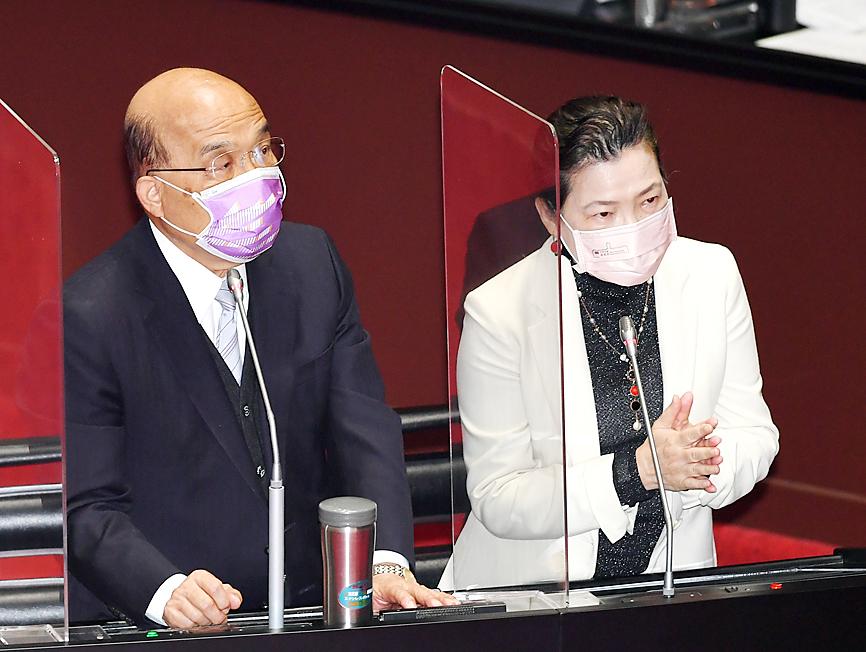The Fourth Nuclear Power Plant would be unsealed if people vote in favor of its activation in a referendum next month, Premier Su Tseng-chang (蘇貞昌) said yesterday, although one of his ministers earlier said that nuclear power is not an answer to Taiwan’s energy challenges.
Provisions of the Referendum Act (公民投票法) stipulate that the plant in New Taipei City’s Gongliao District (貢寮) — which has lain dormant since 2015, when it was mothballed by then-president Ma Ying-jeou (馬英九) — must be unsealed if enough people vote that way on Dec. 18.
Launched by nuclear power advocate Huang Shih-hsiu (黃士修), referendum No. 17 — one of four referendums to be voted on — asks: “Do you agree that the Fourth Nuclear Power Plant should be unsealed and operated commercially to generate electricity?”

Photo: CNA
A possible start of the plant has worried people in the area, Su said at the legislature in Taipei, citing feedback from Yilan County.
The plant was sealed by Ma after public opposition rose due to perceived safety risks at the nearly completed facility.
However, Minister of Economic Affairs Wang Mei-hua (王美花) told reporters before the legislative session that anyone who understands the safety concerns and related problems at the plant would know that activation “is not an option.”
Responding to a comment by Huang that Japan’s Kyushu Electric Power restarted a reactor late last year, despite earthquake and volcano concerns, Wang said that every plant is different.
Taiwan has its own set of circumstances that it must consider, for instance a geological survey after it was built found that the Fourth Nuclear Power Plant is in a fault zone, she said, adding that it has operational problems with its No. 1 generator, which has not passed inspections.
Activation of the plant would take more than 10 years, she said, citing evaluations from the Atomic Energy Council.
All professional decisions on the matter are in the hands of the council, she said.
There would be many issues to work through before the facility could generate power were the vote to succeed, including new construction contracts, as well as fixing outdated equipment and interface integration issues, she said.
The Democratic Progressive Party is intent on phasing out nuclear power by 2025, and Taiwan’s dependence on such energy has fallen significantly from more than 50 percent in 1985 to only 12.7 percent last year, Taiwan Power Co data showed.
Regarding one of the other four referendums, Wang said that banning imports of pork containing ractopamine would “of course” affect Taiwan’s chances of joining the Comprehensive and Progressive Agreement for Trans-Pacific Partnership (CPTPP).
If the nation were to change direction after opening imports at the beginning of this year, it would call into question its respect for WTO rules, Wang told reporters at the legislature.
The CPTPP’s members all conform to the UN Food and Agriculture Organization’s Codex Alimentarius food standards, Wang said.
As a latecomer, Taiwan would face greater scrutiny to join the pact, she said, adding that other nations in informal talks have reminded the government of the agreement’s high standards.
Imports of beef containing ractopamine was approved a long time ago and such beef is proven to be safe, so banning pork would be inconsistent policymaking, she said.

Taiwan has received more than US$70 million in royalties as of the end of last year from developing the F-16V jet as countries worldwide purchase or upgrade to this popular model, government and military officials said on Saturday. Taiwan funded the development of the F-16V jet and ended up the sole investor as other countries withdrew from the program. Now the F-16V is increasingly popular and countries must pay Taiwan a percentage in royalties when they purchase new F-16V aircraft or upgrade older F-16 models. The next five years are expected to be the peak for these royalties, with Taiwan potentially earning

STAY IN YOUR LANE: As the US and Israel attack Iran, the ministry has warned China not to overstep by including Taiwanese citizens in its evacuation orders The Ministry of Foreign Affairs (MOFA) yesterday rebuked a statement by China’s embassy in Israel that it would evacuate Taiwanese holders of Chinese travel documents from Israel amid the latter’s escalating conflict with Iran. Tensions have risen across the Middle East in the wake of US and Israeli airstrikes on Iran beginning Saturday. China subsequently issued an evacuation notice for its citizens. In a news release, the Chinese embassy in Israel said holders of “Taiwan compatriot permits (台胞證)” issued to Taiwanese nationals by Chinese authorities for travel to China — could register for evacuation to Egypt. In Taipei, the ministry yesterday said Taiwan

Taiwan is awaiting official notification from the US regarding the status of the Agreement on Reciprocal Trade (ART) after the US Supreme Court ruled US President Donald Trump's global tariffs unconstitutional. Speaking to reporters before a legislative hearing today, Premier Cho Jung-tai (卓榮泰) said that Taiwan's negotiation team remains focused on ensuring that the bilateral trade deal remains intact despite the legal challenge to Trump's tariff policy. "The US has pledged to notify its trade partners once the subsequent administrative and legal processes are finalized, and that certainly includes Taiwan," Cho said when asked about opposition parties’ doubts that the ART was

If China chose to invade Taiwan tomorrow, it would only have to sever three undersea fiber-optic cable clusters to cause a data blackout, Jason Hsu (許毓仁), a senior fellow at the Hudson Institute and former Chinese Nationalist Party (KMT) legislator, told a US security panel yesterday. In a Taiwan contingency, cable disruption would be one of the earliest preinvasion actions and the signal that escalation had begun, he said, adding that Taiwan’s current cable repair capabilities are insufficient. The US-China Economic and Security Review Commission (USCC) yesterday held a hearing on US-China Competition Under the Sea, with Hsu speaking on